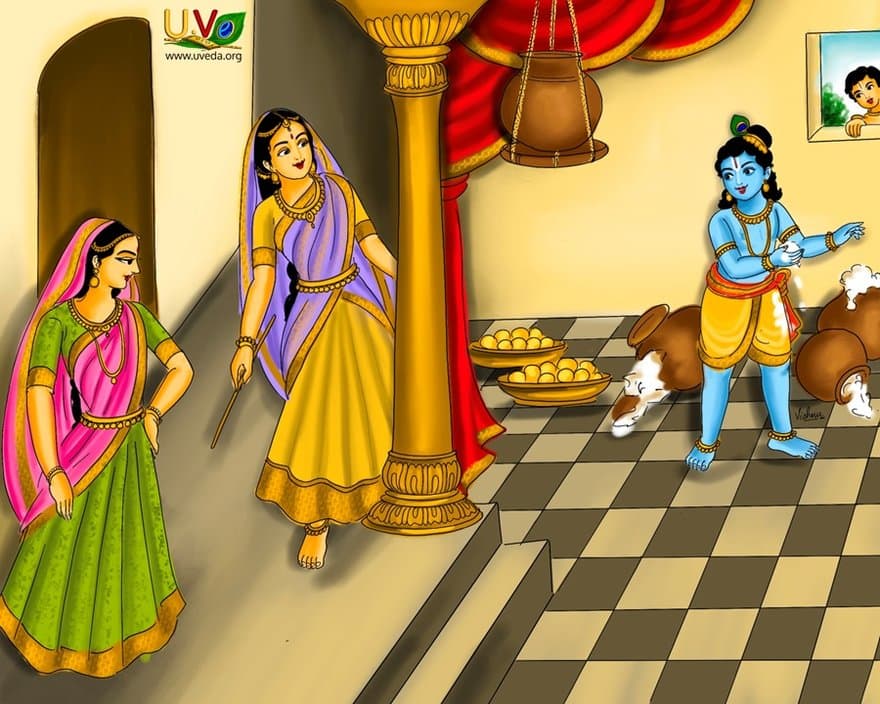Chapter 9
The complaining cowherd women - (வெண்ணெய் விழுங்கி)

Krishna's mischiefs and pranks are unique and delightful! Yashoda lays young Krishna beside her and makes him sleep. Thinking he has fallen asleep, she gets up to attend to the household chores. But Krishna also gets up. He goes to many houses, steals butter, heats and drinks milk, rolls and breaks pots. All the women come running to Yashoda. They complain about each of Krishna's mischiefs. "Krishna! I can't bear to hear the accusations against you. Come here!" Yashoda calls out.
கண்ணனின் தீம்புகளும் விளையாட்டுகளும் தனிப்பட்டவை. சுவை மிக்கவை! குழந்தை கண்ணனை அருகில் படுக்கவைத்து உறங்கச் செய்கிறாள். உறங்கி விட்டான் என்று நினைத்து எழுந்து வீட்டு வேலைகளைக் கவனிக்கச் செல்கிறாள் யசோதை. கண்ணனும் எழுந்தான். பல வீடுகளுக்குச் செல்லுகிறான். வெண்ணெயைக் களவு செய்கிறான்.
- PAT 2.9.1
202 ## வெண்ணெய் விழுங்கி வெறுங் கலத்தை
வெற்பிடை இட்டு * அதன் ஓசை கேட்கும்
கண்ணபிரான் கற்ற கல்வி தன்னைக் *
காக்ககில்லோம் உன்மகனைக் காவாய் **
புண்ணில் புளிப் பெய்தால் ஒக்கும் தீமை *
புரை புரையால் இவை செய்ய வல்ல *
அண்ணல் கண்ணான் ஓர் மகனைப் பெற்ற *
அசோதை நங்காய் உன்மகனைக் கூவாய் (1) * - PAT 2.9.2
203 வருக வருக வருக இங்கே *
வாமன நம்பீ வருக இங்கே *
கரிய குழல் செய்ய வாய் முகத்து எம் *
காகுத்த நம்பீ வருக இங்கே **
அரியன் இவன் எனக்கு இன்று நங்காய் *
அஞ்சனவண்ணா அசலகத்தார் *
பரிபவம் பேசத் தரிக்ககில்லேன் *
பாவியேனுக்கு இங்கே போதராயே (2) - PAT 2.9.3
204 திரு உடைப் பிள்ளைதான் தீயவாறு *
தேக்கம் ஒன்றும் இலன் தேசு உடையன் *
உருக வைத்த குடத்தொடு வெண்ணெய் *
உறிஞ்சி உடைத்திட்டுப் போந்து நின்றான் **
அருகு இருந்தார் தம்மை அநியாயம் செய்வதுதான் *
வழக்கோ? அசோதாய் *
வருக என்று உன்மகன் தன்னைக் கூவாய் *
வாழ ஒட்டான் மதுசூதனனே (3) - PAT 2.9.4
205 கொண்டல்வண்ணா இங்கே போதராயே *
கோயில் பிள்ளாய் இங்கே போதராயே *
தெண் திரை சூழ் திருப்பேர்க் கிடந்த *
திருநாரணா இங்கே போதராயே **
உண்டு வந்தேன் அம்மம் என்று சொல்லி *
ஓடி அகம் புக ஆய்ச்சிதானும் *
கண்டு எதிரே சென்று எடுத்துக்கொள்ளக் *
கண்ணபிரான் கற்ற கல்வி தானே (4) - PAT 2.9.5
206 பாலைக் கறந்து அடுப்பு ஏற வைத்துப் *
பல்வளையாள் என்மகள் இருப்ப *
மேலை அகத்தே நெருப்பு வேண்டிச் சென்று *
இறைப்பொழுது அங்கே பேசி நின்றேன் **
சாளக்கிராமம் உடைய நம்பி *
சாய்த்துப் பருகிட்டுப் போந்து நின்றான் *
ஆலைக் கரும்பின் மொழி அனைய *
அசோதை நங்காய் உன்மகனைக் கூவாய் (5) - PAT 2.9.6
207 போதர் கண்டாய் இங்கே போதர் கண்டாய் *
போதரேன் என்னாதே போதர் கண்டாய்
ஏதேனும் சொல்லி அசலகத்தார் *
ஏதேனும் பேச நான் கேட்கமாட்டேன் **
கோதுகலம் உடைக்குட்டனேயோ *
குன்று எடுத்தாய் குடம் ஆடு கூத்தா *
வேதப் பொருளே என் வேங்கடவா *
வித்தகனே இங்கே போதராயே 6 - PAT 2.9.7
208 செந்நெல் அரிசி சிறு பருப்புச் *
செய்த அக்காரம் நறுநெய் பாலால் *
பன்னிரண்டு திருவோணம் அட்டேன் *
பண்டும் இப் பிள்ளை பரிசு அறிவன் **
இன்னம் உகப்பன் நான் என்று சொல்லி *
எல்லாம் விழுங்கிட்டுப் போந்து நின்றான் *
உன்மகன் தன்னை அசோதை நங்காய் *
கூவிக் கொள்ளாய் இவையும் சிலவே (7) - PAT 2.9.8
209 கேசவனே இங்கே போதராயே *
கில்லேன் என்னாது இங்கே போதராயே *
நேசம் இலாதார் அகத்து இருந்து *
நீ விளையாடாதே போதராயே **
தூசனம் சொல்லும் தொழுத்தைமாரும் *
தொண்டரும் நின்ற இடத்தில் நின்று
தாய்சொல்லுக் கொள்வது தன்மம் கண்டாய் *
தாமோதரா இங்கே போதராயே (8) - PAT 2.9.9
210 கன்னல் இலட்டுவத்தோடு சீடை *
காரெள்ளின் உண்டை கலத்தில் இட்டு *
என் அகம் என்று நான் வைத்துப் போந்தேன் *
இவன் புக்கு அவற்றைப் பெறுத்திப் போந்தான் **
பின்னும் அகம் புக்கு உறியை நோக்கிப் *
பிறங்குஒளி வெண்ணெயும் சோதிக்கின்றான் *
உன்மகன் தன்னை அசோதை நங்காய் *
கூவிக் கொள்ளாய் இவையும் சிலவே (9) - PAT 2.9.10
211 சொல்லில் அரசிப் படுதி நங்காய் *
சூழல் உடையன் உன்பிள்ளை தானே *
இல்லம் புகுந்து என்மகளைக் கூவிக் *
கையில் வளையைக் கழற்றிக்கொண்டு **
கொல்லையில் நின்றும் கொணர்ந்து விற்ற *
அங்கு ஒருத்திக்கு அவ் வளை கொடுத்து
நல்லன நாவல் பழங்கள் கொண்டு *
நான் அல்லேன் என்று சிரிக்கின்றானே (10) - PAT 2.9.11
212 ## வண்டு களித்து இரைக்கும் பொழில் சூழ் *
வருபுனல் காவிரித் தென்னரங்கன் *
பண்டு அவன் செய்த கிரீடை எல்லாம் *
பட்டர்பிரான் விட்டுசித்தன் பாடல் **
கொண்டு இவை பாடிக் குனிக்க வல்லார் *
கோவிந்தன்தன் அடியார்கள் ஆகி *
எண் திசைக்கும் விளக்காகி நிற்பார் *
இணையடி என்தலை மேலனவே (11)